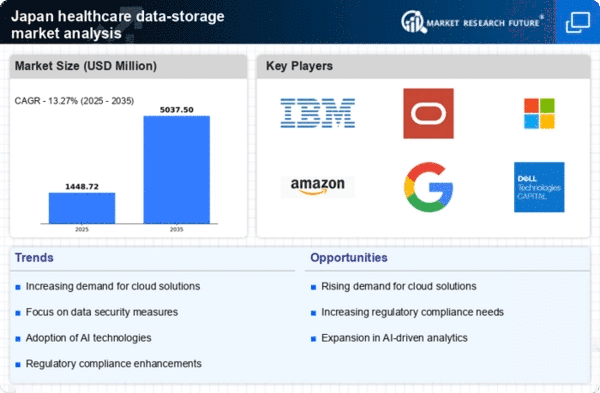Regulatory Compliance Pressure
the healthcare data-storage market in Japan is increasingly shaped by stringent regulatory requirements. The Japanese government has implemented various laws and guidelines aimed at protecting patient data and ensuring its secure storage. Compliance with these regulations is not only mandatory but also critical for healthcare providers to maintain their operational licenses. As a result, organizations are investing heavily in data-storage solutions that meet these legal standards. The market is projected to grow as healthcare providers seek to avoid penalties associated with non-compliance, which can reach up to ¥10 million. This regulatory landscape drives innovation and investment in secure data-storage technologies, thereby enhancing the overall healthcare data-storage market.
Rising Demand for Telemedicine
The healthcare data-storage market is experiencing a surge in demand due to the increasing adoption of telemedicine services in Japan. As healthcare providers expand their telehealth offerings, the need for robust data-storage solutions becomes paramount. Telemedicine generates vast amounts of patient data that must be securely stored and easily accessible. According to recent estimates, the telemedicine market in Japan is expected to reach ¥300 billion by 2026, which directly correlates with the growth of the healthcare data-storage market. This trend indicates a shift towards more integrated healthcare solutions, necessitating advanced data-storage capabilities to support remote consultations and patient monitoring.
Growing Patient-Centric Care Models
The shift towards patient-centric care models is influencing the healthcare data-storage market in Japan. As healthcare providers focus on personalized treatment plans, the need for comprehensive patient data storage becomes essential. This approach requires the integration of various data sources, including electronic health records and wearable health devices, into a unified storage system. The market is expected to grow as healthcare organizations adopt solutions that facilitate seamless access to patient information. By 2025, it is anticipated that 70% of healthcare providers will implement patient-centric data-storage systems, reflecting a significant transformation in the healthcare data-storage market.
Technological Advancements in Data Management
Technological innovations are significantly shaping the healthcare data-storage market in Japan. The introduction of advanced data management systems, including artificial intelligence and machine learning, is enhancing the efficiency and security of data storage. These technologies enable healthcare providers to analyze large datasets more effectively, leading to improved patient outcomes. The market is projected to grow at a CAGR of 15% over the next five years, driven by these advancements. As healthcare organizations seek to leverage data analytics for better decision-making, the demand for sophisticated data-storage solutions is likely to increase, further propelling the healthcare data-storage market.
Increased Investment in Health IT Infrastructure
Investment in health IT infrastructure is a critical driver of the healthcare data-storage market in Japan. The government has recognized the importance of modernizing healthcare systems and is allocating substantial funds to enhance digital health initiatives. This investment is aimed at improving data interoperability and storage capabilities across healthcare facilities. Recent reports indicate that public and private sectors are expected to invest over ¥1 trillion in health IT by 2027. Such financial commitments are likely to stimulate the development of innovative data-storage solutions, thereby expanding the healthcare data-storage market and improving overall healthcare delivery.

















